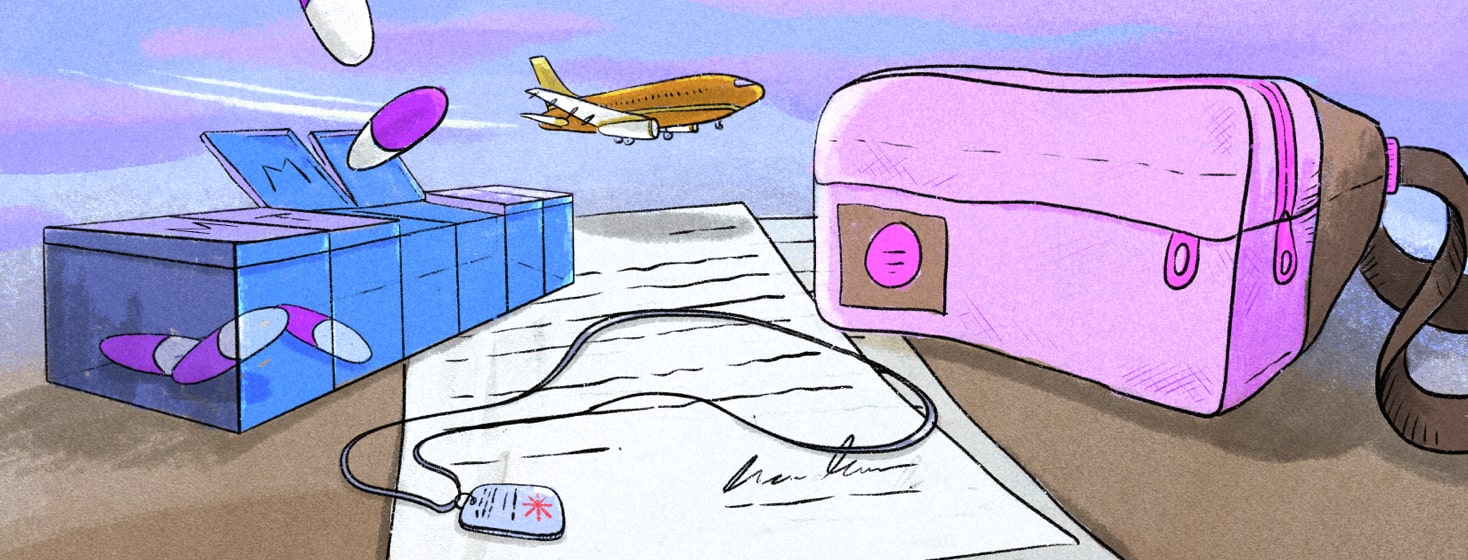Tips for Traveling with Epilepsy
"Pssss. YOU. I'm wantin' to break out of Epilepsy Prison tonight. Nice vacation... Wanna come? Here are some things you need to do..."
Over 5 decades with epilepsy, I've picked up some tricks that extended my flexibility to take long and distant travels, even intercontinental, that lessen my burdens with peace of mind.
Prepping for travel with epilepsy
When I'm afforded 1-2 weeks before "take-off," I'll actually count my tablets to make sure that I have enough doses for the time I'm planning to be away and for several extra days. It's dangerous to panic about running out or to ration my dosages if plans change (like flight cancellations). Nor do I want to be concerned about racing to the pharmacy after getting home! If a refill is necessary, my pharmacy needs time to reach my doctor (who might be relaxing on a vacation of his own).
If a refill is likely to be needed during my trip and it was too early for the pharmacist to give me all that I needed, pharmacists have worked with my doctor to issue a "travel pack" of medication to cover my needs until I would be home. If your trip is domestic, remember that when push comes to shove, it's possible for prescriptions to be refilled by drugstores other than your own: just make sure you're traveling with its phone number and try to give them several days to prepare.
I'm hip in my visible medical alert necklace and bracelet identifying me as being epileptic. EMTs are trained to first look for such jewelry in the event of an emergency.
Now — ready to jump?... Not yet.
Tips for traveling with epilepsy medication
If you're like me, often times the medications I've taken are more expensive than my trips. It's insane to pack them snuggling in a suitcase that I entrust to a stranger with the expectation it will be ready for me at the next airport hours later and hundreds of miles away! Just see the headlines about all the luggage getting lost!
My solution was buying a "fanny pack" and carrying my medicine on my body until I reach my destination. In the event of delays, all my medicine is right with me. If you're traveling with a handbag instead, put your medications in a transparent zipper-lock freezer bag and tape a note-card-sized tag that's labeled: "(YOUR NAME)'S EPILEPSY MEDICATION." (Keeping them all together in 1 bag spares you losing any bottles at the security inspection.)
Sharing that I have epilepsy with people around me
Whether I'm traveling or doing something else, it is always a relief when someone around me knows I'm epileptic and what to do if my behavior becomes "irregular." When traveling alone, whether by plane, train, or bus, it's relaxing once I've shared my "secret" with someone. For instance, I tell the flight attendant/conductor/driver there's a chance I might have a seizure and what they might need to do.
Given what a wild-card epilepsy is, I'll be doing the same even if I’m fortunate enough to be seizure-free for several years (better that, than to pay for an unnecessary ambulance and disrupt everyone's travel schedules). Why do this, you ask?
Planes, cruises, and staying safe
A friend of mine didn't tell anyone about his epilepsy until his airliner had just arrived at the gate of the busiest airport in the world, Atlanta, and a seizure was beginning. His explanation seemed so panicked that the attendants were deaf to his insistence that he only needed to stay seated for a few minutes. He came to wearing handcuffs in the security office!
Likewise, after boarding a cruise ship. There, I delivered a piece of paper to the sickbay which told the ship's medical staff my name, cabin number, seizure type, medications I take, and my neurologist's contact information and a brief paragraph explaining what to do if epilepsy interfered with my cruise. With that task done, I proceeded on my cruises without a problem. I intend to do the same thing with a tour guide if we ever take an international tour, because I don't want to be in a non-English speaking country and be dependent on a guide to figure out what might be wrong with me.
Time to enjoy vacation!
Finally, if your trip is by car with a caregiver or friends, such elaborate precautions aren't necessary. Still, I wear my medical alert jewelry in case there's an accident. I diligently take my medications and keep hydrated – and I let them do the driving. Everyone doesn't need to be stressed out, and our family SUV is practically a spaceship compared to the last vehicle I drove regularly!
Using any or all of these ideas might make the difference in whether your vacation is truly relaxing so that you won't need a vacation after the vacation!

Join the conversation